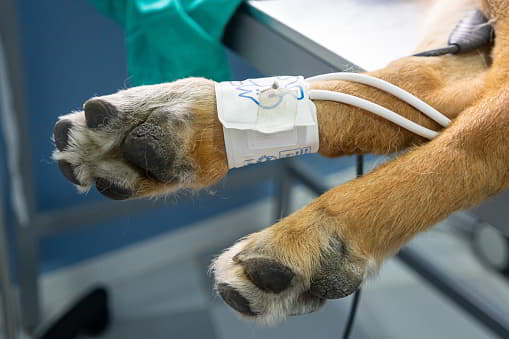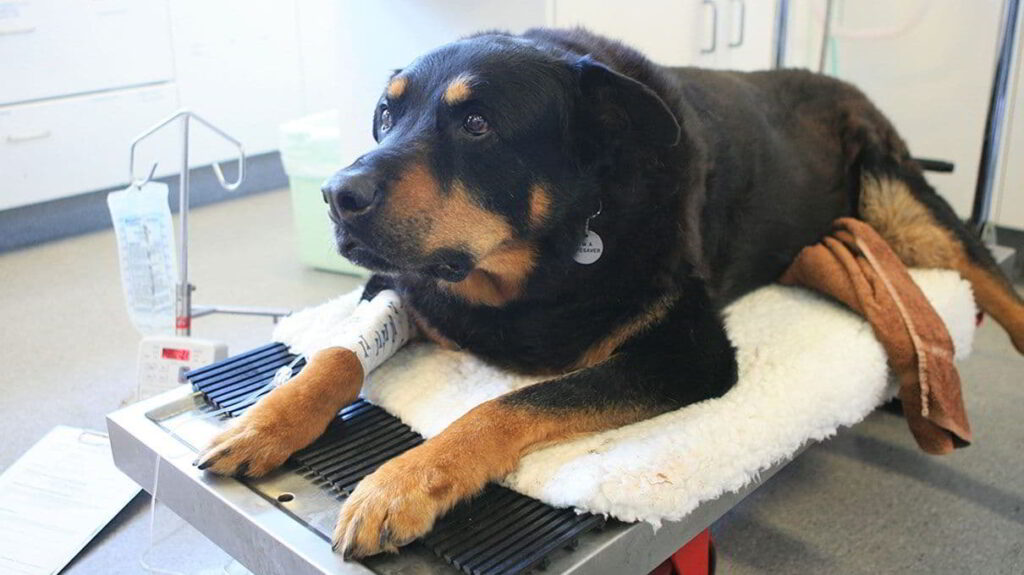Do dogs have blood types, and is it important for you to know your puppy’s blood type? Although blood from a donor offers lifesaving help, today we know that donor bloodstream may carry parasites or viruses. In addition, all canine blood is not created equal-just like people, pets have different blood types and these differences are inherited. Giving incompatible blood can have life-threatening consequences.
What Are Blood Types
Blood groups and types vary and the differences are inherited. Antigens on the surface of the blood cells define a blood type. A drop of serum or plasma from the recipient animal’s blood mixed with a drop of blood from the prospective donor will clump when the blood is incompatible.

When a dog has those specific antigens on its red cells, it’s said to be positive for that particular group. If the red cells do not have a given antigen, then the pet is negative for that blood group. This usually is important, because when a puppy can be injured or ill, a transfusion with whole blood or blood components may be necessary to save the family pet’s life. Giving the wrong type of blood might have dire consequences.
Transfusion Reactions
People (and cats) have very strong antibodies against the wrong type of blood. Our immune system recognizes noncompatible bloodstream as foreign, and attacks and destroys the blood as if it were a virus or bacteria. When a person receives a blood transfusion and the incorrect blood is given, this transfusion reaction can quickly kill the individual.
The signs, though, are non-specific so it can be difficult to know what’s gone wrong. Signs include a change in heartbeat, challengingy breathing, collapse, drooling, tremors, convulsions, weakness, vomiting, and fever. Fortunately, severe reactions are rare usually in dogs.
First Transfusions
Dogs rarely have naturally occurring antibodies the way people and cats do. The dog’s immune system doesn’t seem to immediately recognize incompatible blood, but must be first exposed to incompatible blood before building antibodies against it. For that reason, most dogs can receive a transfusion from any other blood group the 1st time. After that, though, the immune system is “primed” to recognize the foreign blood and if it’s given again, a life-threatening transfusion reaction can happen.
Many times, a dog’s first transfusion takes place under emergency circumstances to save the dog’s life. If he’s never before been transfused, it’s likely he’ll have no adverse reaction to the blood, even if it is incompatible. It’s advised certainly able whenever possible — and always after your puppy has been previously transfused — to identify the dog’s blood type so that sensitization of your dog’s blood and/or a possible life-threatening reaction can be avoided.
Canine Blood Types and Breeds
You’ll find different numbers of dog blood types listed; as many as 13 group systems have been identified but six are most commonly recognized. Dogs can be classified as positive or negative for each DEA (dog erythrocyte antigen). An erythrocyte is a red blood cell.
The canine blood groups most commonly recognized are DEA-1.1, DEA-1.2, DEA-3, DEA-4, DEA-5, and DEA-7.
Some blood types cause more dangerous reactions than others, and the DEA-1. A pet’s size and degree of illness determine how much he’ll need. Dogs that are negative for DEA 1.1 and other blood types are considered “universal donors” able to give to any other blood typed dog. DEA 1.1 negative is in the minority of dogs.
The majority of dogs are DEA 1.1 positive and may only give blood safely to other DEA 1.1. positive dogs. An incompatible transfusion can result in both clumping and destruction of the red cells. Usually, the reaction is immediate, but it may be delayed up to four days.
Some breeds have a predisposition to being DEA 1.1 positive or negative. On the negative column, breeds likely to be DEA 1.1 negative include Greyhounds, Boxers, Irish Wolfhounds, German Shepherds, Doend up beingrmans, and Pit Bulls. Breeds more commonly DEA 1.1 positive are Golden Retrievers and Labradors. If your puppy is one of these breeds, it would be a good idea to have your furry wonder’s blood typed.

Blood Banks And Dogs
Transfusion medicine has made great strides during the past decade since dogs and cats often require a transfusion as a part of their treatment. In 1989, one of the first blood banks for pets was launched by Angell Memorial Animal Hospital in Boston. A standard unit of whole blood is 500cc, or almost 17 ounces, while packed red bloodstream cells and plasma units are smaller.1 group is the worst offender. A number of programs run by veterinary teaching hospitals, as well as private commercial entities, are usually currently available.
Some blood donor programs enlist pet dogs, based on several criteria including health, weight, and age. Others at teaching facilities may already have colonies of dogs (Greyhounds are common because most are DEA1.1 negative–but they’re positive for DEA 3) that get lots of attention and treats for their participation and later could be adopted.
Veterinarians now have easy-to-use canine and feline typing cards to screen for the most problematic blood types in their office. Cross-matching can also be easily done, and although it won’t determine the type, it will tell whether a transfusion reaction will occur or not. Antigens are proteins, carbohydrates, toxins or other substances to which the body responds by producing antibodies.
By Dog Care Tip


0 Comments